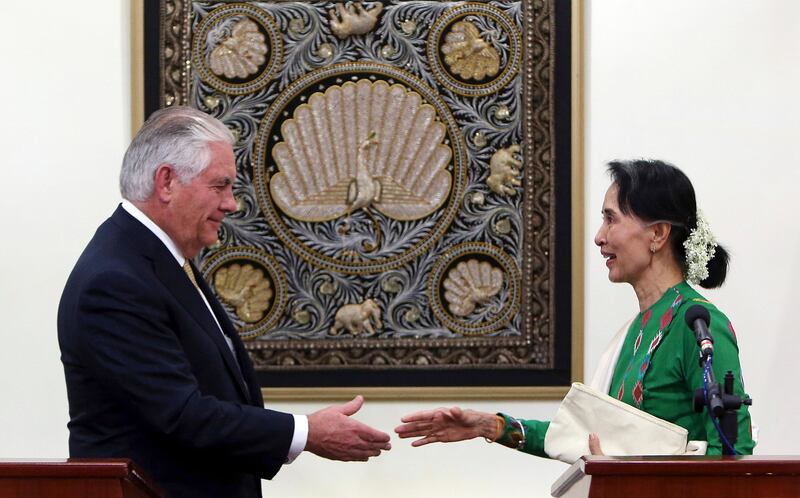US secretary of state Rex Tillerson said on Wednesday he would not yet push for sanctions against Myanmar over the Rohingya refugee crisis, but called for an independent investigation into "credible" reports that soldiers committed atrocities against the Muslim minority.
Mr Tillerson was speaking after a one-day stop in Naypyidaw, the Myanmar capital, as global outrage builds over impunity for a military accused of waging an ethnic cleansing campaign against the Rohingya.
Speaking by his side, Myanmar's de facto civilian leader, Aung San Suu Kyi, hit back at global criticism that she has been silent over the refugee crisis, saying she has instead focused on speech that avoids inflaming sectarian tensions.
More than 600,000 Rohingya have fled the mainly Buddhist country since the military launched a counter-insurgency operation in northern Rakhine state in late August.
________________
Read more:
[ Geldof hands back Dublin honour in Myanmar protest ]
[ Myanmar says UN move could harm talks with Bangladesh over return of Rohingya ]
[ United Nations ramps up the pressure on Myanmar over Rohingya ]
________________
While the army insists it has only targeted Rohingya militants, refugees massing in grim Bangladeshi camps have described chilling and consistent accounts of widespread murder, rape and arson at the hands of the Myanmar security forces and Buddhist mobs.
Speaking after meetings with the army chief and Ms Suu Kyi, Mr Tillerson said broad economic sanctions were "not something that I'd think would be advisable at this time".
"We want to see Myanmar succeed," he said. "You can't just impose sanctions and say therefore the crisis is over."
But he said Washington was "deeply concerned by credible reports of widespread atrocities committed by Myanmar's security forces and vigilantes" and urged the country to accept an independent investigation into those allegations, after which individual sanctions could be appropriate.
"The scenes of what occurred out there are just horrific," he added.
Both the army and Ms Suu Kyi's administration have dismissed reports of atrocities and refused to grant entry to UN investigators charged with probing allegations of ethnic cleansing.
But Washington has been careful to focus blame on the military rather than Ms Suu Kyi, whose fledgling civilian administration is in a delicate power-sharing arrangement with the army.
Though she lacks any say in security policy, the Nobel laureate has been heavily criticised by rights groups for her failure to publicly criticise the military or defend Rohingya against rising Islamophobia — partly because she was so outspoken during the junta years.
Ms Suu Kyi, who rarely holds press conferences, addressed those criticisms on Wednesday.
"I have not been silent … what people mean is what I say is not interesting enough," she said.
"What I say is not meant to be exciting, it's meant to be accurate … not set people against each other."
Ms Suu Kyi's defenders say she must tread lightly to avoid provoking a powerful army that could roll back democratic gains at any time.
The US was a major ally in the democratic opening of Myanmar that eventually led to Ms Suu Kyi taking office after free elections in 2015, ending five decades of military dictatorship.
Washington rolled back junta-era trade bans and sanctions on military cronies at key points in the transition to encourage progress.
But the Rohingya crisis has pushed US lawmakers to propose a renewal of targeted military sanctions.
Mr Tillerson said he would review the bills upon return to Washington.
As anger over the plight of Rohingya mounts abroad, Myanmar's army has dug-in with its denial of abuses — while also curbing access to the conflict zone.
Ahead of Mr Tillerson's arrival, the commander-in-chief published an internal investigation that exonerated soldiers of all allegations, saying there was no evidence troops had killed civilians, raped women or used "excessive force" in Rakhine.
Rights groups blasted the report as an attempt to "whitewash" atrocities by a military with a long history of abuses, especially against ethnic minorities in border regions.





